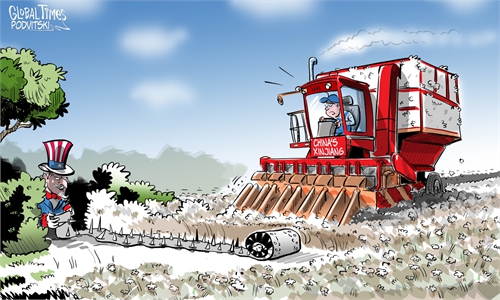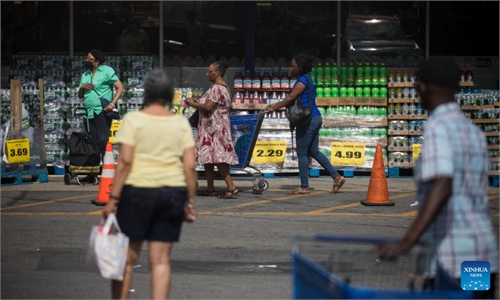US malicious 'forced labor' law based on lie of century poisons intl businesses: regional spokesperson
Photo: Vitaly Podvitski
The so-called forced labor allegation is the lie of the century by anti-China forces in the US and the West and the US' law to ban all products from China's Xinjiang region has severely infringed the interests of both Chinese and American companies and consumers, damaged the global supply chain and also poisoned the international business environment, regional spokesperson Xu Guixiang told a press conference on Friday.
The US' so-called Uyghur Forced Labor Prevention Act (UFLPA) took effect on Tuesday. It bans products made in China's Xinjiang, smearing the Chinese government over "oppression" of the Uygurs and other minority populations in its Xinjiang region.
The enforcement of the law is an escalation of the US' efforts to contain China using human rights as an excuse. It severely violates international trade rules, affects the stability of the global supply chain and international laws, and fully exposes the US' hegemonic attitude, Xu said at a press conference on Friday.
Xu pointed out that international laws have specific definitions for "forced labor" and there is no forced labor in Xinjiang. The US is not qualified in making such accusations. However, it is using the so-called forced labor issue to interfere in China's domestic affairs, which also shows no respect for international laws.
China has approved 28 international treaties on labor and fulfilled its responsibilities - it not only applies the international standards for protecting labor rights but also sets its own laws and regulations to defend rights, Xu said.
The Xinjiang region has also implemented related laws and regulations to promote employment based on people's own willingness and tried to create a better environment to help residents of all ethnic groups to find a better job and enjoy stable income, the spokesperson said.
Previously, residents living in southern Xinjiang had reduced access to clean water and could not always find safe places to live. But now they have much better lives thanks to getting jobs, enjoying clean water, living in big houses with their children and having good access to schools, Xu noted.
"The government has helped local residents to live a better life, which is its responsibility. How wrong can this be?" asked Xu.
The whole world has become integrated through the development of globalization and Chinese and overseas companies have co-existed and cannot be separated from each other. The sanctions the US has imposed on China not only hurt the Chinese companies' interests but also make the American companies suffer, said Xu.
The US has required all companies to conduct a review of their links with Xinjiang, which forces companies to spend money and time on useless work. Such moves have increased the costs for companies and severely damaged the fairness of the business environment. It brings no good to others or the US itself, said Xu.
Xu also noted that the US uses this malicious law to seize products from Xinjiang, which is robbery and hegemonic behavior born of a cold war mentality. It aims to create unemployment to destabilize the Xinjiang region, which China firmly opposes.




